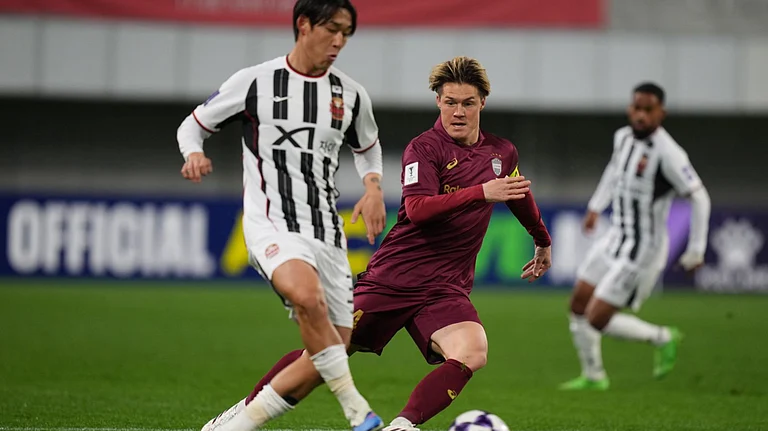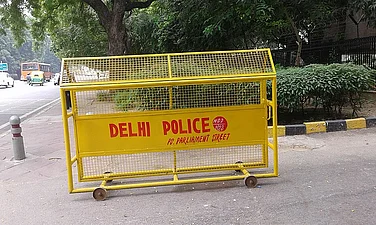NOT every traffic jam is a VVIP's doing. But in Delhi and in other major cities, a VVIP and his attendant X, Y, Z or Z-plus security leave a trail of harassed people on the roads. Ambulances halt. So do buses. And office-goers or those rushing to catch a plane or train spend some harrowing moments as they wait for the dignitary and his convoy to pass. The irony of it all is that the security comes at a price—a hefty Rs 32.89 crore of the taxpayer's money is spent every year to protect VVIPs.
What's more, securitymen are often accused of being high-handed and unnecessarily tough with civilians. An issue that rankled the National Human Rights Commission (NHRC) so much that it has written to various state governments seeking details of the number of people under security cover. It was acting on a complaint by S.S. Jayagovinda, 75, a cancer patient from Nainital, who was appalled at the brutal handling of devotees at the Moti Doongri Ganesh Temple in April 1993 by President S.D. Sharma's securitymen. In a four-page letter to the NHRC, Jayagovinda described the security arrangements as "patently untenable, anti-social and barbaric".
It is not clear what action it will recommend but, according to NHRC sources, the issue is being discussed 'threadbare'. This apart, the commission is consulting security agencies like the Intelligence Bureau (IB), the Special Protection Group (SPG), the National Security Guards (NSG) and the Delhi Police to help improve matters.
There are many instances of VVIP high-handedness. And Delhi tops the list of cities which is a citizens' nightmare with the overbearing presence of gun-toting commandos and rude security personnel. This is not surprising since 500 of the nearly 5,000 'protected persons' in the country live in Delhi. The security cover is also a drain on the capital's traffic police. Points out additional DCP (traffic), Delhi Police H.P.S. Virk: "Peak-hour VVIP visits to various samadhis cause much inconvenience and we try to keep them at a minimum."
At airports, the presence of a top VVIP—president, prime minister or foreign dignitary—upsets other flights and costs the national exchequer a lot of money. The Delhi airport is closed for about 30 minutes before and after a VVIP flight takes off or lands. Even vehicle movement on the tarmac is restricted. Last February, as many as 30 Indian Airlines flights were delayed by the mandatory closure of the Delhi airport because of a VIP flight. The cost of such delays for every flight per minute is about Rs 10,000. The Air Traffic Controller (ATC) has suggested several measures to reduce public inconveniences but to no avail.
THE ATC even suggested that the air base at Hindon be kept solely for VVIP flights. Says one official: "We give the same importance to all national and inter -national flights in regard to safety and security. Despite this, a hype is being created around VVIP security. For instance, an Air Force helicopter goes around the Delhi skyline before the VVIP flight takes off or lands to pre-empt saboteurs or anti-aircraft guns. That only delays proceedings. "
As for the people, they end up suffering the most. Says Supreme Court lawyer Soli Sorabjee: "No doubt, security is essential. But VVIP security spells harassment and unavoidable trouble to the public." Painter Anjolie Ela Menon is more vocal: "It is infuriating, a mere display of power. After waiting more than six hours at the petrol pump near Race Course Road for a pollution check, we were asked to go to Chanakyapuri because the Prime Minister was going out! I have lived in Paris and London. Nowhere is the security so overdone as in India."
The 'protected persons' list is a veritable Who's Who. Those with Z-plus security include Farooq Abdullah, J. Jayalalitha, Gen. Krishna Rao, Punjab Kesri owner-editor Ashwini Kumar Mina, S.B. Chavan, Rajesh Pilot, Arjun Singh, H.K.L. Bhagat, Sajjan Kumar, Jagdish Tytler, Buta Singh, Maninder Singh Bitta, Mulayam Singh Yadav, Mayawati, T.N. Seshan, L.K. Advani, Matang Singh, Ghulam Rasool Kar, former Assam minister Bhumidar Burman, Prakash Singh Badal and M.M. Dhar. The Z-category security is for the likes of P.K. Dave, Madan Lal Khurana and Delhi Police Commissioner Nikhil Kumar. Even N.K. Sharma, Nara-simha Rao's astrologer, comes under the Z cover.
But do all protected persons require such high-level security from the country's elite NSG? Opinions are divided. Politicians and bureaucrats who have security cover often do not like to give it up even though the "perceived threat" no longer exists. But many feel that once the threat recedes, the security cover must be withdrawn. Points out Prakash Singh, who was DGP Assam, UP, and DG, BSF: "The permanent deployment of the NSG for VVIP security does not have legal sanction. The state police force can be equipped to deal with it."
The main objective of the NSG, which came into force in September 1986, was to provide for a Central armed force to combat terrorism. In 1989, it was assigned the additional role of providing security to VVIPs who were listed in the Z category. It was also asked to undertake anti-sabotage checks when Parliament was in session. But over the years, more and more politicians are being given special security, thus diverting the NSG from its raison d'etre.
POINTS out Home Secretary K. Padmanabhaiah: "Many MPs, MLAs from Rajasthan, Bihar and Uttar Pradesh have been successful in getting a high security cover. If some individual is threatened, he should contact the local police. But he often bypasses the police and pressurises the government for high security. This has given rise to a new class of people."
Ever since the Rajiv Gandhi assassination and the controversy over whether adequate security was provided to the late prime minister, the Government does not take chances and provides security to VIPs who claim they face a threat. This is perhaps why Padmanabhaiah says that the Home Ministry is very clear about who should be provided security: "Individuals whose lives are threatened because of the public postures they adopt should get NSG cover." It is the IB which assesses the threat perception, but according to IB Director Arun Bhagat, "it is up to the Home Ministry to finally provide the security."
More often than not, demanding security cover has become a habit with politicians. Points out Prakash Singh: "As the DGP of Uttar Pradesh in 1991, I reassessed the security threats to Mulayam Singh Yadav and found that he did not need NSG cover. We sent our recommendations to the Centre. The UP police raised a special force on the lines of the NSG called the Cobras to protect VIPs in the state. But the Centre did not withdraw Mulayam's NSG cover for political reasons." According to R. Swaminathan, former IB officer and special secretary in the Cabinet, leaders ask for security since they see it as a "status symbol".
Sources in the IB say that its directorate had submitted a report to the Home Ministry to either withdraw or downscale security to more than 120 'protected persons', including Seshan, Sharad Yadav, Subodh Kant Sahay, N.D. Tewari and Sanjay Gandhi's son Varun. But their security has not been downscaled.
Says a senior Home Ministry official: "The officers are refraining from taking any decision. Indecisiveness stems from the disciplinary action against former Cabinet secretary V.C. Pandey and former home secretary Raj Bhargava, who were charged with being responsible for Rajiv's assassination. So, if any individual is attacked after we withdraw security, the government will bay for our blood." It is probably due to this attitude that the oft-repeated request of former prime minister V.P. Singh to withdraw SPG protection for him and his family has been denied.
V.P. Singh's attitude is more of an exception. Politicians do not take kindly to withdrawal of security. A.P. Durai, DGP, Karnataka, triggered a debate on the wasteful expenditure incurred by the state on Prime Minister H.D. Deve Gowda's children's security in a letter to the Prime Minister's Office on December 7. Gowda immediately ordered the setting up of a committee to reduce their security. But Durai paid for being so forthright. He was transferred to Delhi as director-general of the Railway Protection Force.
But can security cover alone protect a VVIP? According to Home Ministry officials, no security can serve as a substitute for proper intelligence. According to them, intelligence is not a "well-oiled" machinery in India. The assassinations of Indira Gandhi, Rajiv Gandhi, Gen. Arun Vaidya and former Punjab chief minister Beant Singh took place not because their security failed but because the intelligence agencies were not aware of the plot.
A change of perception of security is long overdue. Also, those who seek protection should avoid imposing their security on citizens. Former NSG director Ved Marwah even suggests that politicians should perhaps rely more on the mass media to keep in touch with the masses rather than hold rallies, which again is a cause of great inconvenience for the common man. That perhaps is wishful thinking.




















.png?w=200&auto=format%2Ccompress&fit=max)





